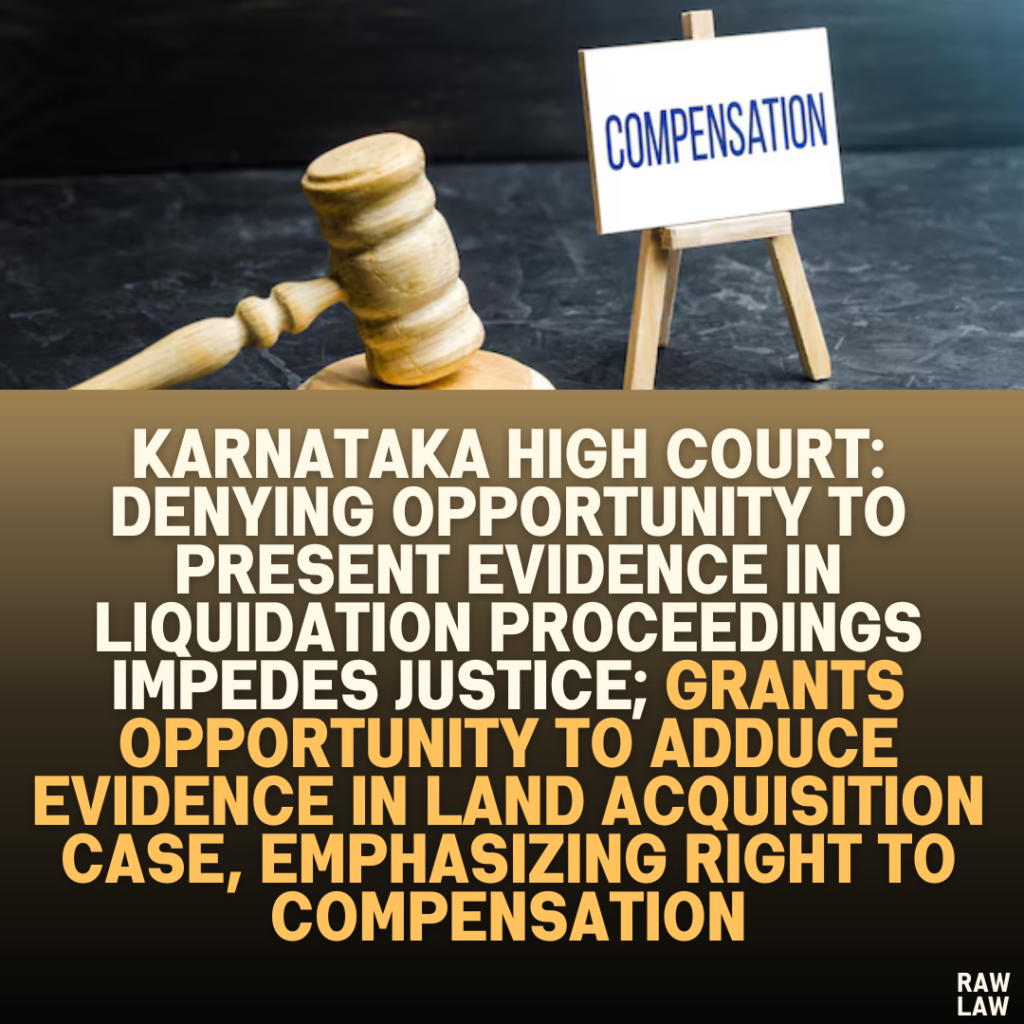Court’s Decision:
The Karnataka High Court allowed the writ petition, setting aside the orders of the District Court dated February 9, 2024, and October 23, 2024, which had denied the petitioner an opportunity to present evidence. The High Court granted liberty to the petitioner to adduce evidence in the next hearing. The Court clarified that failure to utilize this opportunity would permit the District Court to proceed in accordance with the law.
Facts:
- The petitioner, a company undergoing liquidation, had its land acquired for the formation of a National Highway under the National Highways Act, 1956.
- The compensation amount was deposited with the District Court, initiating proceedings to determine the rightful claimant.
- Due to liquidation and miscommunication, the petitioner failed to present evidence before the District Court, leading to orders declaring the evidence as “nil.”
- Applications filed by the petitioner to reopen the case and recall the earlier orders were dismissed by the District Court, prompting this writ petition.
Issues:
- Whether the petitioner should be granted an opportunity to lead evidence in the compensation claim proceedings despite earlier defaults.
- Whether the orders of the District Court rejecting the petitioner’s applications to reopen and recall were justifiable.
Petitioner’s Arguments:
- The petitioner argued that the failure to adduce evidence was due to unavoidable circumstances arising from the liquidation process.
- It sought a fair opportunity to present its claim to ensure optimal utilization of the compensation in the liquidation proceedings.
Respondent’s Arguments:
The High Court Government Pleader contended that sufficient opportunities had already been granted, and the petitioner had failed to utilize them, thereby justifying the District Court’s decisions.
Analysis of the Law:
- The Court relied on the principles of fairness and equity, emphasizing that liquidation does not preclude the petitioner from asserting its rights.
- Section 151 of the Code of Civil Procedure, 1908, was invoked to ensure justice by recalling procedural lapses and permitting a fresh opportunity for evidence presentation.
Precedent Analysis:
No specific precedents were cited. The analysis was based on equitable principles and procedural fairness.
Court’s Reasoning:
- The Court acknowledged the petitioner’s lack of diligence but stressed the importance of providing an opportunity to substantiate the claim, especially considering the involvement of public funds and the liquidation process.
- It highlighted that denying the petitioner an opportunity would impede justice, as compensation for the acquired land was a substantive right.
Conclusion:
The impugned orders were set aside, and the petitioner was permitted to present evidence in the next hearing. The Court warned that no further indulgence would be granted if the petitioner failed to utilize this opportunity.
Implications:
The judgment underscores the judiciary’s commitment to balancing procedural compliance with substantive justice, especially in cases involving liquidation. It reaffirms the principle that procedural lapses should not override legitimate claims, ensuring equitable outcomes in such disputes.




Pingback: Orissa High Court: "Dismissal of CISF Constable for Stabbing Colleague Upheld" – Court Affirms Penalty as Proportionate, Highlighting 'Preponderance of Probability' Standard in Departmental Inquiries Over Criminal Standard of 'B